
NEOPLASIA
Scope & Guideline
Uncovering breakthroughs in cancer biology and treatment.
Introduction
Aims and Scopes
- Cancer Biology and Mechanisms:
Research focused on understanding the underlying biological mechanisms of cancer, including genetic mutations, signaling pathways, and cellular processes that contribute to tumorigenesis. - Therapeutic Targets and Drug Development:
Exploration of new therapeutic targets and the development of innovative drugs, including small molecules, monoclonal antibodies, and immunotherapeutic agents. - Tumor Microenvironment and Immune Interactions:
Investigation of the tumor microenvironment's role in cancer progression, immune evasion, and response to therapy, including studies on tumor-infiltrating lymphocytes and immune checkpoint inhibitors. - Clinical Applications and Patient Outcomes:
Studies that bridge laboratory research with clinical applications, focusing on treatment efficacy, patient stratification, and real-world evidence to improve cancer care. - Genomic and Epigenomic Profiling:
Research utilizing genomic and epigenomic technologies to identify biomarkers for early detection, prognosis, and personalized treatment strategies.
Trending and Emerging
- Immunotherapy and Immune Modulation:
There is a significant increase in studies exploring immunotherapy, including checkpoint inhibitors, CAR T-cell therapy, and combination strategies that enhance anti-tumor immune responses. - Targeting the Tumor Microenvironment:
Emerging research focuses on the tumor microenvironment, including the roles of stromal cells, extracellular matrix components, and immune cell interactions in cancer progression and therapy resistance. - Precision Medicine and Genomic Profiling:
A trend towards personalized medicine is evident, with increasing studies on genomic profiling, biomarker discovery, and targeted therapies tailored to individual patient profiles. - Metabolic Reprogramming in Cancer:
Research investigating how cancer cells alter their metabolism to support growth and survival is gaining traction, particularly in understanding drug resistance and therapeutic vulnerabilities. - Artificial Intelligence and Machine Learning in Oncology:
The integration of AI and machine learning technologies in cancer research and diagnostics is rapidly emerging, with studies focusing on predictive modeling, imaging analysis, and treatment optimization.
Declining or Waning
- Traditional Chemotherapy Studies:
Research centered on conventional chemotherapy regimens appears to be waning as newer targeted therapies and immunotherapies gain prominence in clinical practice. - Single-Agent Drug Studies:
There is a noticeable decrease in studies focusing solely on single-agent drug efficacy, with a growing trend towards combination therapies that target multiple pathways. - Basic Histopathology:
While foundational histopathological studies remain important, there is a shift towards advanced molecular and genomic approaches that provide deeper insights into cancer biology. - Non-Molecular Biomarkers:
Research on traditional non-molecular biomarkers is less prevalent as the field moves towards integrating molecular and genetic markers for better prognostic accuracy.
Similar Journals
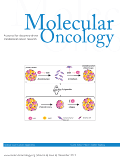
Molecular Oncology
Unlocking Innovations in Molecular Medicine.Molecular Oncology, published by WILEY, is a premier open-access journal that has been at the forefront of cancer research since its inception in 2007. With an impressive impact factor reflective of its outstanding contribution to the field, it holds a prestigious position in the Q1 category across multiple disciplines, including Cancer Research, Genetics, and Molecular Medicine. This journal is essential for researchers and professionals seeking to publish high-quality findings in a rapidly evolving area of study, underscored by its significant Scopus rankings that place it within the top percentiles of Oncology and Molecular Biology. As an open-access journal since 2017, it ensures that vital research is readily available to a global audience, thereby facilitating collaboration and knowledge dissemination among academic and clinical communities. With its commitment to innovative and impactful research, Molecular Oncology continues to be a critical resource for advancing our understanding of cancer biology and treatment.
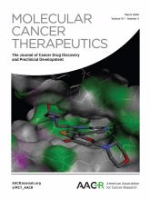
MOLECULAR CANCER THERAPEUTICS
Exploring the molecular mechanisms behind cancer therapies.MOLECULAR CANCER THERAPEUTICS, published by the American Association for Cancer Research, is a premier journal dedicated to advancing the field of cancer research and therapy since 2001. With a notable impact factor reflecting its high-quality content, this journal stands out in the Q1 category for both Cancer Research and Oncology as of 2023. Researchers, clinicians, and students interested in innovative treatment strategies and molecular mechanisms can find valuable insights within its pages, bolstered by a rigorous peer-review process and a global perspective on cancer therapeutic developments. Although the journal operates under a subscription model, it provides comprehensive access to cutting-edge studies and reviews that drive forward the understanding of cancer biology and treatment modalities. The journal's impressive Scopus rankings further validate its influence within both oncology and the broader cancer research community, making it an indispensable resource for anyone committed to combating cancer through science.
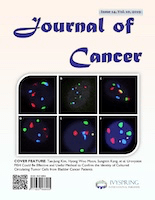
Journal of Cancer
Elevating cancer research to new heights.Journal of Cancer is a premier, peer-reviewed academic journal published by IVYSPRING INTERNATIONAL PUBLISHING that focuses on advancing the field of oncology. With an impact factor reflecting its significant contributions, this journal ranks in the 80th percentile of medical journals pertaining to oncology, positioning it at #79 out of 404 in Scopus. Since its inception in 2010, the journal has embraced an Open Access model, ensuring that groundbreaking research reaches a global audience without barriers. Based in Australia, the journal addresses a wide array of topics within cancer research, catering to researchers, healthcare professionals, and students committed to enhancing their understanding of the complexities of cancer. Amidst evolving challenges in oncology, the Journal of Cancer serves as a vital platform for disseminating innovative findings, fostering collaboration, and promoting informed decisions that can lead to improved cancer outcomes worldwide.

Oncology Reviews
Leading the Way in Open-Access Oncology ResearchOncology Reviews, founded in 2007 and published by FRONTIERS MEDIA SA, is a leading open-access journal dedicated to advancing knowledge in the field of oncology and cancer research. With an Impact Factor reflecting its robust engagement in scholarly discourse, this journal maintains a prestigious standing, earning a Q2 ranking in Oncology and a Q3 ranking in Cancer Research as of 2023. Notably, it is indexed in Scopus, where it ranks #118 in Oncology and #98 in Cancer Research, highlighting its global reach and significance. The journal's open-access policy, in effect since 2012, ensures that high-quality research is accessible to all, fostering collaboration and wellness improvements worldwide. This commitment to accessibility and dissemination of pivotal research makes Oncology Reviews an essential resource for researchers, healthcare professionals, and students eager to contribute to and stay abreast of the latest innovations in cancer treatment and research.

Cancer Research Communications
Advancing the frontiers of cancer knowledge.Cancer Research Communications is an esteemed journal published by the American Association for Cancer Research, a leading organization in the field of oncology. This journal aims to advance knowledge in cancer research through the dissemination of high-quality, peer-reviewed articles that cover a wide range of topics related to cancer biology, treatment modalities, and prevention strategies. As an open-access journal, Cancer Research Communications ensures that vital research findings are accessible to a global audience, promoting collaboration and innovation within the scientific community. The journal serves as a crucial platform for researchers, professionals, and students to share their insights and foster the exchange of effective cancer therapies and methodologies. With a commitment to excellence, it plays a significant role in shaping the future of cancer research and therapeutic development.

CANCER IMMUNOLOGY IMMUNOTHERAPY
Unraveling the Complexities of Immunology and OncologyCancer Immunology Immunotherapy, published by Springer, stands as a premier journal in the fields of cancer research and immunology, holding a prestigious Q1 ranking across multiple categories, including Oncology and Medicine as of 2023. With an ISSN of 0340-7004 and an E-ISSN of 1432-0851, this journal has been a pivotal platform for groundbreaking research since its inception in 1976, continuing to provide insight into the complex interactions between the immune system and cancer. The journal's scope encompasses a wide array of topics, including novel therapeutic strategies, immunological mechanisms, and translational science aimed at advancing treatment outcomes for cancer patients. Renowned for its rigorous peer-review process and high impact factor, it attracts contributions from leading experts and researchers around the globe, positioning itself among the top-tier publications with Scopus rankings that reflect its vital role in advancing the field. Access options are generally subscription-based, ensuring a comprehensive resource for professionals and academics seeking to deepen their understanding and make meaningful contributions to cancer immunotherapy.
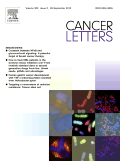
CANCER LETTERS
Connecting research with impactful cancer care.Cancer Letters, a leading journal published by Elsevier Ireland Ltd, is dedicated to advancing the field of oncology and cancer research. With a rich history that spans from 1975 to 2024, this esteemed journal has established itself as a vital resource within the scientific community, holding a prestigious Q1 status in both Cancer Research and Oncology categories as of 2023. With an impressive ranking of #26/404 in Medicine _ Oncology and #19/230 in Biochemistry, Genetics and Molecular Biology _ Cancer Research, Cancer Letters sits in the top percentiles of its field, reflecting its high impact and relevance. Although it does not currently offer open access, the journal remains committed to disseminating paramount research findings, innovative methodologies, and critical reviews that inform and enhance ongoing studies in cancer therapeutics and patient care. Researchers, professionals, and students alike will find invaluable insights into the latest developments and discoveries in cancer research through the pages of Cancer Letters.
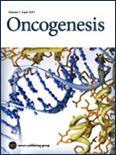
Oncogenesis
Leading the charge in oncogenesis research and education.Oncogenesis is a prestigious open access journal, published by SpringerNature, dedicated to advancing our understanding of cancer biology and molecular mechanisms of oncogenesis. Since its inception in 2012, this journal has quickly established itself as a leading platform for innovative research, being ranked in the Q1 quartile in both Cancer Research and Molecular Biology categories for 2023. With an admirable impact factor that reflects its exceptional quality, Oncogenesis is indexed in Scopus, holding notable rankings in both Molecular Biology and Cancer Research, placing in the 87th and 83rd percentile respectively. The journal not only facilitates the dissemination of groundbreaking research but also encourages collaboration among scientists and healthcare professionals across the globe. By offering open access to its articles, Oncogenesis ensures that vital findings reach a diverse audience, fostering a deeper dialogue and understanding in the fight against cancer. Based in the United States but with a global reach, the journal remains committed to publishing high-impact studies that contribute to the advancement of knowledge in the realms of oncology, biochemistry, and genetics.

JCO Precision Oncology
Leading the Charge in Precision Oncology ResearchJCO Precision Oncology, published by Lippincott Williams & Wilkins, is a leading journal in the field of cancer research and oncology, recognized for its high-impact contributions and innovative approaches to precision medicine. Since its inception in 2017, this journal has consistently ranked in the Q1 category in both Cancer Research and Oncology for 2023, reflecting its esteemed position within the academic community. With a rigorous peer-review process and a focus on disseminating cutting-edge research, JCO Precision Oncology serves as a vital platform for researchers, clinicians, and healthcare professionals aiming to enhance the understanding and treatment of cancer through individualized therapies. The journal's comprehensive scope includes studies on genetic profiling, biomarker research, and novel therapeutic strategies, making it an essential resource for anyone involved in cancer care and research. Explore further and join a community committed to advancing precision oncology and improving patient outcomes.
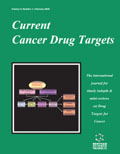
CURRENT CANCER DRUG TARGETS
Empowering researchers to redefine oncology and pharmacology.CURRENT CANCER DRUG TARGETS is a prominent academic journal published by Bentham Science Publishers Ltd, focusing on the critical intersection of cancer research and innovative drug development. Since its inception in 2001, this journal has offered a platform for the dissemination of cutting-edge research aimed at advancing targeted cancer therapies, contributing significantly to the fields of Cancer Research, Drug Discovery, Oncology, and Pharmacology. With a respectable impact factor and consistent ranking in its respective categories, including Q2 in Drug Discovery and Pharmacology, it positions itself as an invaluable resource for researchers, clinicians, and students alike. CURRENT CANCER DRUG TARGETS is dedicated to enhancing our understanding of novel therapeutic targets and methods, thereby fostering a collaborative environment for knowledge exchange in the ever-evolving landscape of cancer treatment.